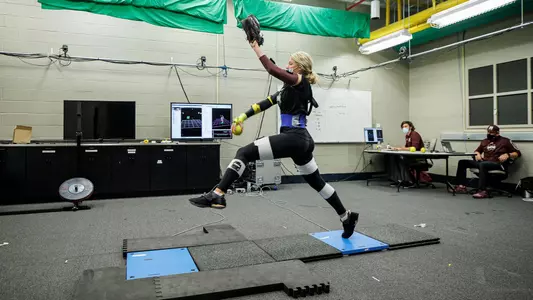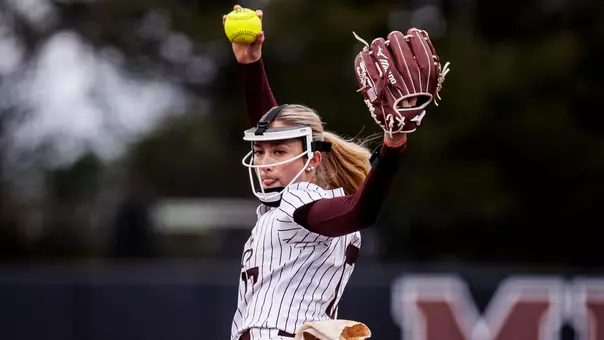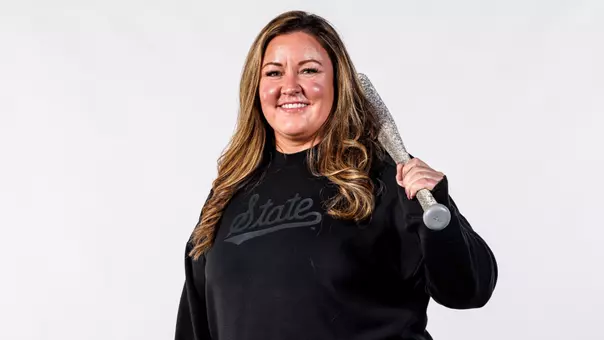
Building A Better Bulldog
November 16, 2021 | Softball, Joel Coleman
Josh Johnson is using science to try and develop the ultimate softball player.
STARKVILLE – Mississippi State pitcher Annie Willis arrived at the MSU Center for Advanced Vehicular Systems and before she entered the building, the thought rushed through her head.
"What am I getting myself into right now?" Willis recalled with a smile.
Willis and several of her teammates were about to take part in research conducted by State softball assistant coach Josh Johnson. The tests are a part of Johnson's ongoing march toward his doctoral degree. And they're also designed to make Mississippi State softball – and softball as a whole – better.

Personal Engineer
MSU hurler Kenley Hawk has perhaps the most appropriate description for Johnson.
"It's like a little engineer in our pocket all the time," Hawk said.
Adds pitcher Aspen Wesley: "He's always on the go and definitely thinks outside the box."
On this day, Johnson thinking outside the box actually put his players inside of one. Or more accurately, inside a small room in a CAVS lab.
Motion capture sensors were carefully applied all over the bodies of each player before one by one, they all took turns delivering a pitch. Careful adjustments were made to ensure the accurate collection of data. All the while, Johnson was overseeing the proceedings. He gathered information on his athletes including the way their bodies moved, as well as the amount of force their bodies produced – kinematic and kinetic data respectively.
"What we're hoping is this is the beginning of a database of elite athletes that we're going to now have moving forward to start to find what we're looking for and create training programs based upon that," Johnson explains.
Sparking An Interest
You might be wondering how a softball coach got so deep into the weeds of technology – much deeper than even many of the players he guides would dare to delve.
"He loves technology," Willis said of Johnson. "We're complete opposites on that spectrum. I don't do technology. I don't know how to use it half the time."
Luckily for Willis and her teammates, she didn't have to worry about figuring any of this out. Johnson had it covered.
Johnson's interest in such things dates back to his own playing days. He was being trained by Adam Kirkpatrick; a guy Johnson had previously met while competing. Kirkpatrick served as a bit of an inspiration for Johnson, basically opening up Johnson's mind to new ways of training and coaching.
"Most pitching coaches said, 'This is the way you do it,'" Johnson said. "[Kirkpatrick] didn't say that. He brought up scientific things and why the body moves the way it does and why it needs to move the way it does."
Kirkpatrick introduced Johnson to others who thought the same way. Johnson came to realize other sports, such as track, were using science to build better athletes. Johnson wanted the same for the game he loved so much.
"I just saw it as, 'Man, this is a way we can make the game better if we know the body better and how it's supposed to operate,'" Johnson said.
Johnson's Quest
So the foundation was laid for experiments like this latest one.
If you've ever seen the behind-the-scenes features of how video games are made, this was that come to life. Sensors were strapped all over players' bodies and every single wiggle or motion was recorded.
"I felt like a robot," Wesley said.

Each player delivered several pitches. Now to be fair, it wasn't a perfect experiment. The high-intensity deliveries sometimes resulted in sensors being slung from arms. No matter. It's all part of this process according to Johnson.
"Collecting motion capture data is all about troubleshooting and problem solving," Johnson said. "One of the things we realized is the cluster for the hand is probably not going to work. Not long term. We broke two of them in a day. So I'm designing right now a new way to do that cluster."
If Johnson is successful, he'll have a tool to gather better data. He'll also have a weapon that could enhance Mississippi State.
"Maybe I can build a product we can use and it's exclusive to us," Johnson said. "Maybe it means there's a lot of trial and error we have to go through, but it also means we're a step ahead of the competition."
Getting Out Front
Therein lies much of the beauty of all of Johnson's work. In working towards his doctorate and discovering new things, he's simultaneously getting the Bulldogs ahead of the curve.
Make no mistake, not every school has a Josh Johnson in their back pocket – someone constantly pouring over research and data, making sure no stone is unturned.
"It's trying to find a hole that we can exploit in the knowledge that we have and find a way we can create a competitive advantage," Johnson said. "I want to create a system that allows us to take a pitcher three steps up every single year instead of one, taking them to a level where they're constantly competing for not only national championships, but for being on the U.S. National team and doing all those things to be the best in the world. I think we can find that… This is competition. This is competing. We talk about being better, but shoot, we want this to be a recruiting advantage as much as a player advantage. We want the best of the best to come here so that they could be the best they could ever possibly be."

An Ongoing Journey
This latest experiment is only a small piece of what Johnson has already brought, and plans to bring, to Mississippi State. He's always looking for the next way he can use science to push State further ahead.
As for himself, Johnson continues to march down the road towards his doctorate in exercise science with an emphasis in biomechanics. He's minoring in industrial engineering as well.
"I'm probably two years out," Johnson said of when he'll finish what will be his third degree. "I can't take a ton of classes."
For obvious reasons. There are coaching duties. There's recruiting. There are all the things someone in Johnson's role has to do.
The ironic thing is Johnson's research and educational work might make him more effective in his other duties – for players, for Mississippi State and maybe even for softball as a whole. But it's an ongoing process and one that is far, far from done.
"We're trying to find things we can hone in on so that we can start to really maximize what our girls do," Johnson said. "The ultimate goal is to create the super machine, but we need to know more."







